Thank you for visiting Advisor On My Side. The best way to ensure you are working with a true fiduciary – a financial advisor who does not just “talk the talk” but is legally bound to provide unbiased, commission-free financial advice and investment management – is to use the checklists and diagnostic tools provided by the contributing organizations below.
Educational Materials and Tools from:
National Association of Personal Financial Planners

The National Association of Personal Financial Advisors (NAPFA) is the country’s leading professional association of Fee-Only financial advisors—highly trained professionals who are committed to working in the best interests of those they serve. NAPFA has developed high standards: each advisor member must sign and renew a Fiduciary Oath yearly and subscribe to NAPFA’s Code of Ethics.
Following NAPFA’s Fiduciary Oath requires that advisors:
- Always act in good faith and with candor
- Be proactive in disclosing any conflicts of interest that may impact a client
- Not accept any compensation contingent upon the purchase or sale of a financial product
NAPFA’s mission is to provide networking opportunities, education, business development, and advocacy to promote the professional success of fee-only, comprehensive financial advisors. The organization’s 3,600 members enjoy resources that are tailored specifically for them – to help advance their career, grow their business and sharpen their skills.
As an organization, NAPFA strives to be:
- The beacon for independent, objective financial advice for individuals and families
- The champion of financial services delivered in the public interest
- The standard bearer for the emerging profession of financial planning
Since its inception, NAPFA has been a staunch advocate for fiduciary principles. Working under fiduciary principles is the most transparent – and we believe the most objective – way of serving the public. Consumers have come to expect fiduciary-level advice and should be able to count on the SEC to deliver rule proposals that affirm that expectation.
Resources Provided by NAPFA
This series of GIFs and this Infographic from NAPFA explain the meaning of the term “fiduciary,” why it’s important and how you can go about finding a financial planner who follows a fiduciary standard.
Please also check out:
NAPFA’s Pursuit of a Financial Advisor Field Guide, which will walk you through all of the steps to finding qualified financial advice.
FINANCIAL ADVISOR DIAGNOSTIC: After you have selected advisors to interview, print this diagnostic and ask the advisors to complete it. Review the answers and compare them to the “answer key” of NAPFA-recommended responses that is included in the Diagnostic. If the advisor’s responses closely match the answer key, you can be confident that the advisor will work in your best interests.
FINANCIAL ADVISOR CHECKLIST: The checklist is an excellent way to get an overview of an advisor’s capabilities. Print copies of this checklist and present it to the advisors you are considering hiring. Use their responses as a basis for then deciding which advisor to interview.
Institute of the Fiduciary Standard

The Institute for the Fiduciary Standard is a champion for investors. It is a nonprofit think tank that exists to further fiduciary principles and practices. The Fiduciary Institute provides policy analysis, education and advocacy for investors, advisors and policy makers.
Real Fiduciary™ Practices provide advisors concrete and understandable guidance. They describe how conscientious and competent advisors serve clients today. They help investors distinguish advisors who work for and are paid only by clients from sales representatives who work for and are paid by firms to distribute products.
Read more about Real Fiduciary™ Practices
All Advisors talk the talk. They say they do what’s best for you. Yet, few can. Few can act in your best interest and can put it in writing. Real Fiduciary™ Advisors can.
Real Fiduciary™ Advisors:
Real Fiduciary™ Advisors are experienced and objective and only compensated by client fees. They walk the walk and put what they do in writing for you.

See the Real Fiduciary™ Advisors and Practices on the Institute for the Fiduciary Standard website. More information: info@thefiduciaryinstitute.org.
The Committee For The Fiduciary Standard

The Committee For The Fiduciary Standard was formed in June 2009 by a group of investment professionals and fiduciary experts, just as policymakers and industry leaders were reviewing the repercussions of the financial crisis, to advocate that all investment and financial advice be rendered as fiduciary advice and meet the requirements of the five core fiduciary principles.
Five Core Principals
- Put the client’s best interests first
- Act with prudence, that is, with the skill, care, diligence, and good judgment of a professional
- Do not mislead clients — provide conspicuous, full, and fair disclosure of all important facts
- Avoid conflicts of interest
- Fully disclose and fairly manage, in the client’s favor, unavoidable conflicts
Most recently, The Committee wrote to urge the SEC to consider the issue of misleading titles and advertising, as a part of its deliberations regarding when and where fiduciary duty should apply. Here is a portion of their statement:
It is no secret that, over the years, the brokerage industry has morphed away from the use of the traditional “stockbroker” or “registered representative” titles and toward those titles that emphasize that an advisory relationship exists, such as “financial advisor” or “wealth manager.” Hence, it is not surprising that investors are confused about the nature of the services offered by their financial professionals. In survey after survey, consumers have indicated that they do not understand the key distinctions between the duties, services, and compensation models of investment advisers and broker-dealers. Consumers attribute their confusion in large part to the brokers’ use of titles such as “financial advisor” and “financial consultant.”
The Committee goes on to say that:
The authentic fiduciary standard legally requires an investment adviser to act, under the Investment Adviser Act of 1940, as a medical doctor would, completely in their clients’ best interest.
Whereas:
The “arms-length” suitability standard allows a broker or advisor to recommend clients products that are in the best interest of their firm.
The difference, they say, is stark:
If an investor is wronged by a broker, the burden is on the investor to prove the broker’s wrongdoing.
If the investor is wronged by a fiduciary advisor, the burden is on the advisor to prove they acted in the client’s best interest.
Fiduciary Oath
The Committee believes that investors have a right to know whether or not their advisor is acting in their best interests. For those investors and firms that believe the same, the Committee has drafted a straight-forward oath declaring an advisor’s commitment to adhere to a fiduciary ethic and, in so doing, be accountable for the advice to their clients. They recommend that investors insist the oath be signed by their advisors before entering into a relationship.
You can download a copy of The Committee’s fiduciary oath here.
The Alliance of Comprehensive Planners

The Alliance of Comprehensive Planners Members are innovators in retainer-based fee-only comprehensive financial planning. Through the ACP Success
ACP Members adhere to a Canon of Ethics that says, in part, that the advisor is in a fiduciary relationship with clients, which means that they will put each client’s interests first, before their own interests or any others, and disclose potential conflicts of interest to all clients and prospective clients. Furthermore, they will provide financial planning services solely as a fee-only advisor, and will act objectively in all matters with clients and will not accept any commissions based on advice or recommendations given.
Read more about the ACP Pledge to Clients.
Additional resources, including a directory of members, are available at www.ACPlanners.org.
Garrett Planning Network

Everyone needs competent, objective financial advice from time to time. The Garrett Planning Network has a nationwide membership with hundreds of independent, Fee-Only financial planners providing advice to people from all walks of life, without minimum account requirements, sales commissions, or long-term commitments. Members proudly embrace their fiduciary duty, always placing their clients’ best interests first.
Sheryl Garrett, CFP®, AIF®, founder of Garrett Planning Network, has been dubbed “The All-American Planner,” because of her zealous mission to “help make competent, objective financial advice accessible to all people.” The author of numerous books on personal financial planning matters, Sheryl has been widely-recognized within the financial services industry as a pioneer and consumer advocate. Sheryl has also been honored to work with the House Subcommittee on Financial Services regarding predatory lending regulation and has testified before Congress on financial literacy and Social Security reform. She has also worked as a consultant and expert witness in lawsuits against financial advisors who rendered questionable or inappropriate financial advice.
Download Garrett’s Financial Advisor Interview Questionnaire.
Sheryl also offers tips for savvy consumers when it comes to choosing the right financial or investment advisor in her book, Personal Finance Workbook For Dummies® (Wiley, 2008, 2012). You can find these by downloading a free copy of Chapter 20 from Personal Finance Workbook For Dummies®V1.
Download Chapter 20 from the Personal Finance Workbook for Dummies®V1.
Learn more about the Garrett Planning Network and find additional resources at GarrettPlanning.com.

